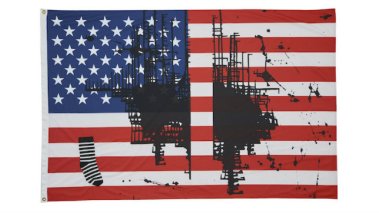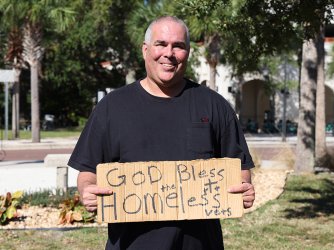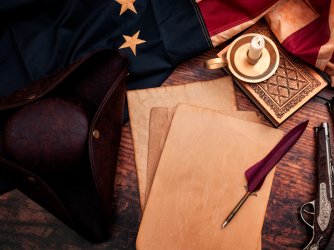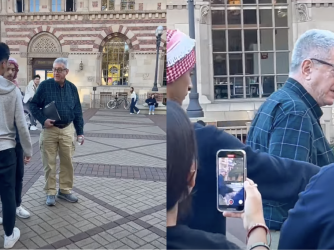Table of Contents
Civil liberties coalition calls on University of Kansas to restore flag art display

LAWRENCE, Kan., July 16, 2018 — Today, the Foundation for Individual Rights in Education joined with two prominent civil liberties organizations to call on the University of Kansas to reject censorship and restore an art display that the university removed last week.
On July 11, KU officials removed a piece of artwork following a “demand that it be taken down immediately” by Kansas Gov. Jeff Colyer and other politicians. The piece features a collage of an American flag intended to represent “a deeply polarized country.”
FIRE joined with the American Civil Liberties Union of Kansas and the National Coalition Against Censorship to issue their own demand: restore the flag and stand up to censorship.
TAKE ACTION: TELL THE UNIVERSITY OF KANSAS TO TAKE A STAND AGAINST CENSORSHIP
“Censorship won last week, but today, we’re fighting back for the First Amendment,” said Will Creeley, FIRE’s senior vice president for legal and public advocacy. “The law is clear: The government can’t censor artistic expression just because powerful people don’t like it. Artistic freedom is especially important at our public colleges and universities, and we’re proud to stand with the ACLU of Kansas and the National Coalition Against Censorship in its defense.”
The letter reminds KU that as a public institution, it is obligated to protect the First Amendment rights of its students and faculty.
The civil liberties groups criticize KU Chancellor Douglas A. Girod for acquiescing to politicians’ calls for censorship. According to the letter, “By so doing, you have sent a clear message to the KU community and would-be censors that the institution will capitulate to complaints regarding the content and viewpoint of expression on campus.”
In the 1989 case of Texas v. Johnson, the U.S. Supreme Court struck down a Texas statute prohibiting flag desecration on First Amendment grounds. The court noted that we “do not consecrate the flag by punishing its desecration, for in doing so we dilute the freedom that this cherished emblem represents.” Instead, the court observed that its decision served as “a reaffirmation of the principles of freedom and inclusiveness that the flag best reflects, and of the conviction that our toleration of criticism ... is a sign and source of our strength.”
After initially defending the flag art, KU Chancellor Douglas A. Girod met with Colyer and later issued a statement ordering the flag to be relocated to the Spencer Museum of Art, citing “public safety concerns.” FIRE has filed public records requests with the university to gather information about those concerns.
“If KU has legitimate ‘public safety concerns,’ it should tell the public what they are,” said Creeley. “Would-be censors have learned that an angry phone call might be all it takes to revoke the First Amendment at the University of Kansas. Successful tactics will be repeated, and KU has a non-negotiable obligation to stand up for free speech.”
But according to Colyer, censorship by removal was not enough. “It’s not appropriate to have a desecrated U.S. flag at a taxpayer-funded institution,” said state spokesperson Kendall Marr. “[The governor] doesn’t want it at the university at all.” In a Fox News radio interview, the governor said the university could “dispose” of the art “properly and with respect” through the American Legion or Boy Scouts, and that he would “be happy to make that call.”
The controversy at KU arose just one day after FIRE released “One Man’s Vulgarity,” a report documenting FIRE’s many years fighting against art censorship on campus.
The artwork, “Untitled (Flag 2),” was created by artist Josephine Meckseper for a series called “Pledges of Allegiance,” featuring 16 artworks displaying a rotation of flags addressing a variety of themes and topics by artists from around the world. Meckseper describes her work as “a collage of an American flag and one of my dripped paintings which resembles the contours of the United States.” The series is a project of the New York-based arts nonprofit Creative Time.
“Art has a responsibility to drive hard conversations,” Creative Time told FIRE in an emailed statement. “Pledges of Allegiance was begun to generate dialogue and bring attention to the pressing issues of the day. The right to freedom of speech is one of our nation’s most dearly held values. It is also under attack. We are proud to stand by artists who express themselves. Today’s events illustrate the same divisions in our country that the series has confronted head-on.”
TAKE ACTION: TELL THE UNIVERSITY OF KANSAS TO TAKE A STAND AGAINST CENSORSHIP
The Foundation for Individual Rights in Education (FIRE) is a nonpartisan, nonprofit organization dedicated to defending and sustaining the individual rights of students and faculty members at America’s colleges and universities. These rights include freedom of speech, freedom of association, due process, legal equality, religious liberty, and sanctity of conscience — the essential qualities of liberty.
CONTACT:
Daniel Burnett, Communications Manager, FIRE: 215-717-3473; media@thefire.org
Ask the University of Kansas to restore the artwork
Recent Articles
FIRE’s award-winning Newsdesk covers the free speech news you need to stay informed.


FIRE Statement: X Corp's lawsuit and Texas's investigation into Media Matters for America are deeply misguided

Anonymous speech is as American as apple pie
